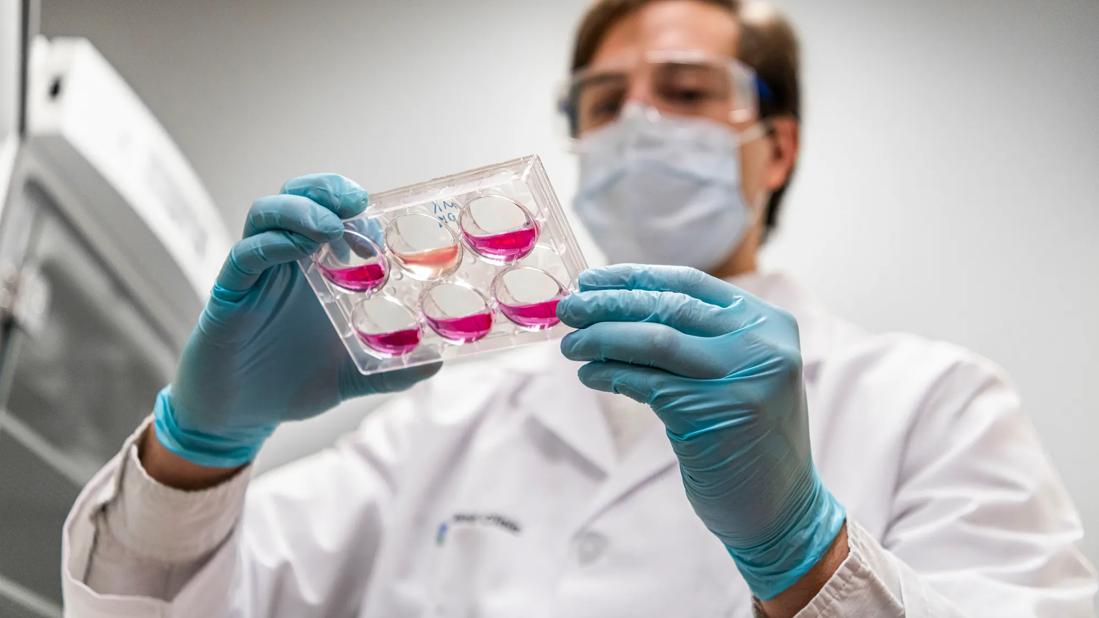Study finds good hematologic response and rapid action

Daratumumab has been approved as a monoclonal antibody for multiple myeloma since 2015. Recent research from Cleveland Clinic Cancer Center investigators adds to the evidence that it may also be a safe and effective treatment for amyloid light-chain (AL) amyloidosis.
Advertisement
Cleveland Clinic is a non-profit academic medical center. Advertising on our site helps support our mission. We do not endorse non-Cleveland Clinic products or services. Policy
The small cohort study found not only that daratumumab resulted in hematologic response in more than 80% of relapsed/refractory patients, but also that it worked quickly, indicating that it could be important in preventing organ damage, a major cause of mortality with the disease.
“This was one of the first reports that shed light on the use of this drug in AL amyloidosis,” said hematologist/oncologist Jack Khouri, MD, the study’s lead author.
With results of a phase III clinical trial of daratumumab in newly diagnosed AL amyloidosis patients expected later in 2020, Dr. Khouri is hopeful the drug may soon be approved as part of the standard of care for the disease.
AL amyloidosis is a rare disease that produces a buildup of amyloid protein in major organs including the heart, liver and kidneys, impairing their function and causing organ failure in severe cases. Front-line therapy has been a combination of cyclophosphamide, bortezomib and dexamethasone, but most patients don’t achieve a complete response, and relapses are common.
In multiple myeloma patients, daratumumab works by targeting the surface glycoprotein CD38 expressed by plasma cells in bone marrow, Dr. Khouri explains. “The amyloid cells in AL amyloidosis express the same CD38 surface marker that daratumumab targets,” he says. “So we thought that this drug could also work in AL amyloidosis.”
The cohort study looked at outcomes in 20 patients, including 15 at Cleveland Clinic and five at Detroit’s Karmanos Cancer Institute. All were relapsed or refractory AL amyloidosis patients. The majority previously had been treated with high dose melphalan and autologous haematopoietic cell transplantation.
Advertisement
Participants received daratumumab weekly for eight weeks, followed by every other week for eight doses, then monthly until indications of disease progression. Prior to daratumumab administration, all patients were premedicated with acetaminophen, antihistamines and corticosteroids to minimize the risk of daratumumab-associated infusion reactions.
Most patients tolerated therapy well. Infusion reactions were the most common adverse event. Two patients experienced a single non-recurring grade 3 reaction. No grade 4 or 5 adverse events occurred.
After 10 months, five of the 15 patients who were assessable for hematological response achieved a complete response and eight attained a very good partial response, with a median response time of four weeks. Two patients died from complications of cardiac amyloidosis.
The study builds on previous research, including a retrospective cohort study by Stanford University physicians that found similar results.
The new findings are significant not only because they add to the evidence that daratumumab can be a safe and effective treatment for AL amyloidosis, but because of how quickly it worked, Dr. Khouri says.
“We think that controlling the disease rapidly and early is important, because it prevents further organ damage and helps preserve people’s hearts and kidneys,” he says. “Heart failure is the main reason for poor outcomes with this disease, so I hope that daratumumab will have a huge impact on cardiac outcomes in this population.”
Cleveland Clinic Cancer Center recently participated in a multi-center phase III clinical trial examining the efficacy and safety of daratumumab in newly diagnosed AL amyloidosis patients. In the study, which involves more than 400 patients, participants were randomized into two groups, with some receiving daratumumab in combination with standard-of-care chemotherapy, and others receiving chemotherapy alone. Results are expected to be published later in 2020.
Advertisement
“Hopefully it will get us an approval for this drug soon, and daratumumab will be part of the standard of care for newly diagnosed patients,” Dr. Khouri says.
Long a major referral center for AL amyloidosis, Cleveland Clinic launched its multidisciplinary Amyloid Clinic in 2019 with the goal of coordinating patients’ care. The clinic is composed of a hematologist, cardiologist, nephrologist and neurologist who work as a team to treat patients.
“Since we are a center of excellence in hematology, oncology and cardiology, it made sense to collaborate,” Dr. Khouri says. “We can make medical decisions on the spot, together, for the patient. It makes outcomes better, and patients do better in general — that’s what we’re seeing.”
Advertisement
Advertisement

Radiation therapy helped shrink hand nodules and improve functionality

Standard of care is linked to better outcomes, but disease recurrence and other risk factors often drive alternative approaches

Phase 1 study demonstrates immune response in three quarters of patients with triple-negative breast cancer

Multidisciplinary teams bring pathological and clinical expertise

Genetic variants exist irrespective of family history or other contributing factors

Study shows significantly reduced risk of mortality and disease complications in patients receiving GLP-1 agonists

Structured interventions enhance sleep, safety and caregiver resiliency in high-acuity units

Addressing rare disease and challenging treatment course in an active young patient